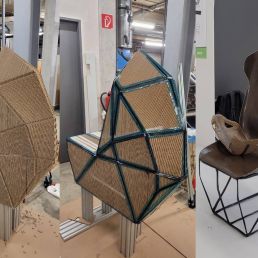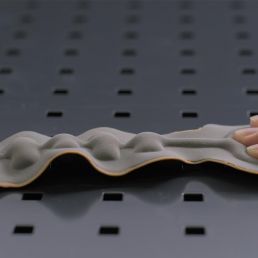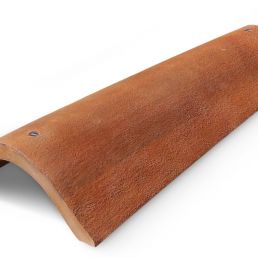
Megatrends in the furniture industry
EFIC Furniture Day · Brussels
19 May 2022, 10:00
At the beginning of the 20s of the 21st century, the major transformation processes take place in the furniture industry in the twin transitions to more digitization and sustainability. A few years ago, the expansion of digital strategies in the furniture sector was not as relevant as it is now, but the corona pandemic is changing customer behavior significantly.
Furniture industry in transition
While brick-and-mortar retail experienced losses or, at best, stagnated due to the pandemic-related measures, online furniture retail was expanded. With annual growth rates of 7-8%, online furniture sales will have doubled by 2025 compared to 2020.
This goes hand in hand with a stronger interlocking of the stationary and virtual sales experience. While the online presence of a furniture retailer will develop into platforms for information gathering, product customization and virtual planning with digital instruments such as augmented reality, the stationary salesroom is changing in the direction of a showroom with an event character.
There, the customer can experience the feel and materiality of a piece of furniture together with the spatial design feeling. With the use of interactive terminals, OLED screens and tablets, he encounters the sales staff as providers of ideas and no longer in the classic role of a salesperson.
Secondary material cycles for the furniture industry
The war in Ukraine clearly shows us the importance of another necessary transformation: Sustainability is becoming the all-important criterion for the future viability of the European Economic Area!
As a reaction to the political and economic turmoil, the states of the European Union will significantly accelerate into a functioning circular economy using regenerative energies. The furniture industry in particular has been and is strongly influenced by interrupted supply chains, which must be avoided in the future.
Sustainable product solutions based on recyclable materials will gain in relevance, the design of which will show reduced complexity and material diversity. Experts are assuming that the position of the European timber industry as a supplier of materials will expand. Because as a volume material, wood is indispensable in the furniture industry.
At the same time, the raw material wood with its by-products such as lignin and cellulose contained in its structure is gaining importance as a basis for material innovations in other industries such as the textile and packaging sectors or the construction and chemical industries.
As a result, there will be a shortage and increased price of wood, which was already used during the pandemic. Strategies are currently being developed at European level to reduce the pressure on wood stocks and ensure availability.
In addition to these measures, however, other strategies are also required to meet the demand for bio-based raw material sources. In this context, new cycles for previously little or unused secondary resources are gaining in relevance.
Whether it’s fish scales, coffee grounds, orange peel or pomace: highly interesting innovations in the biological cycle make it possible to develop materials and set up companies that will enormously increase material efficiency in certain material areas.
Completely new production methods are also of great importance for the furniture industry. Mechanisms of biofabrication allow, for example vegan leather alternatives, acoustically effective materials and bio-based foams to be created. The basis is provided by biotechnologically produced in vitro cultures, the growth of fungal mycelium, enzymatic treatment methods or bio-based reagents.
Not only can they be used to create refractory material surfaces without the use of chemicals or plastics, but the colors and weathering qualities typical of tropical types of wood can also be transferred to European types of wood.
In his keynote on the occasion of the EFIC Furniture Days (EFIC – European Furniture Industries Confederation) Hon.-Prof. Dr. Sascha Peters will present the current and future megatrends relevant to the furniture industry in the context of the European Green Deal and the digitization strategy Industry 4.0 and show some highly exciting innovations.
Program and registration: www.efic.eu/furnitureday2022
image: board from fish scales (source: Scalite)
Ecoblaq molecular wood colours
23 March 2024
Ecoblaq is a molecule manipulation method, a natural chemical reaction, making…
Natural fiber reinforced car seat
22 October 2023
The focus of the project "Design for Recycling" is a seat shell that is made…
MotorSkins morphing textiles
19 April 2022
Berlin based start-up MotorSkins designs and produces textiles with embedded…
3D Pioneers Challenge 2022
15 December 2021
The 3D Pioneers Challenge 2022 adresses tech pioneers who pave the way for…
IGNIS – Light from waste heat energy
12 August 2020
The availability of affordable, independent and, above all, clean electrical…
Brake disc with reduced fine dust
21 April 2021
Fine dust endangers our health. One of the main sources is traffic, especially…
Texoversum
15 July 2023
With the "Texoversum", Reutlingen University has put into operation a training…
Invisible Terracotta Solar Rooftile
10 May 2023
The family-run business Dyaqua has developed a technology to integrate a…
Xarvio – Digital Farming
8 January 2021
BASF Digital Farming GmbH has received the renowned Crop Science Award for the…








